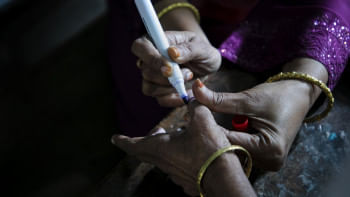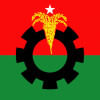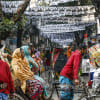The election is not the endgame

The day before the election, I asked my rickshaw puller on my way to work if he would be voting the next day or not. He told me he had voted in every single election since the 1990s, but that he wouldn't vote at this one. "There is only one contestant in this contest. What difference will my vote make?" he asked. He said his son and daughter, both of whom lived in Dhaka, had travelled to their village home to cast their votes. Their mother lived there by herself, and they had heard that those who didn't vote would face trouble in their village. As they didn't want their mother to face any harassment once the election was over, they went to their village to vote.
On my way back home from work, I asked another rickshaw puller the same question. He said he won't return to his village to vote as travelling is expensive. He said he had voted for Awami League in every single election till 2014. "Those who came to power on the back of my vote have snatched away my right to vote. What is the point of me voting anymore?" he asked. As he pulled away his rickshaw from the gate of my house, I heard him saying—perhaps to me or perhaps to himself—that he will not vote again.
On election day, I visited one of the biggest slums in Dhaka. During conversations with its dwellers, almost everyone asked the same question: "What's the point of this election?" Its winner has already been predetermined.
So, what's the point of this election?
Firstly, it's so that those who are in power can continue being in power and claim they are doing so somewhat legitimately. Secondly, it is more for the geopolitical optics.
It is no secret that the ruling party has been under some pressure from powerful Western countries—especially the US—to not repeat what happened in the elections of 2014 (where 153 out of 300 seats were declared uncontested) or of 2018 (where "voting" largely took place the night before the election). Hence, the ruling party has been scrambling to place dummy candidates to contest seats against party-nominated candidates. And, just so it doesn't have to resort to substantial vote-rigging, Awami League has also been threatening and coercing voters to turn up at polling centres, with an aim of showing a reasonable percentage of voter turnout.
But, why? Well, according to Election Commissioner Anisur Rahman, there is a possibility that Bangladesh could face isolation from the world if the election were not free, fair, and credible. "If we can't make this election acceptable, our future would be uncertain," he said. So, the ruling party has to portray an "acceptable" voter turnout at this election to the rest of the world. Even the chief election commissioner admitted that there "is an international dimension" to the election, which "none can underestimate."
As of writing this article, it seems voter turnout will not exceed 50 percent even with some reports of vote-rigging. Will that be "acceptable" enough? And will it make up for the "repressive" environment—according to United Nations Special Rapporteur Clément Nyaletsossi Voule—that was created in the country in the run-up to the election? Even before election day, the election had been described as "a one-sided affair," "a one-woman show," and even an outright "farce" by the Western media. By engineering the percentage of voter turnout, can the ruling party legitimise the election to the Western world?
The answer to that question will not only impact the ruling party, but the future of Bangladesh as a whole. Given the economic cracks that have appeared in recent times, any damage in economic, trade, or even aid relations with Western countries in particular, would deal severe damage to our economic future/prospects. So, even though important Awami League leaders have been reassuring the people that everything will be fine once the election is over and that there will be no problems with other countries, given the hostile rhetoric that has also been coming out simultaneously from the ruling party camp, for the general public, it cannot be said for certain that the geopolitical games that Bangladesh finds itself in are now over.
On the flipside, the idea among the political class—in both the ruling and opposition camps—that outside powers will determine the political landscape in Bangladesh is, I believe, a mistaken one. Ordinary people in Bangladesh might not understand the intricacies of the geopolitical games that are afoot. However, they understand very well the political and economic realities facing them. Their very real struggles of not being able to vote in consecutive elections, and of not being able to afford three square meals a day, mean they are now stuck in an extremely difficult battle for survival—which our detached political class cannot even fathom.
How will the ruling party deal with the geopolitical pressures, the jailing and persecution of thousands of opposition activists, and the discontent of the general public due to the extremes in corruption, mismanagement in governance, and outright looting of public wealth and national resources, all at the same time? The election, therefore, might not be the endgame after all—there are too many uncertainties that still lie ahead.
This absurd election has ended. But it has failed to provide any answers as to how the fundamental cracks and divisions in our society can be addressed, including the enormous inequalities—whether they be political, social, or economic—that have emerged, particularly as a result of the people losing their voting rights.
Eresh Omar Jamal is a journalist at The Daily Star. His X handle is @EreshOmarJamal
Views expressed in this article are the author's own.
Follow The Daily Star Opinion on Facebook for the latest opinions, commentaries and analyses by experts and professionals. To contribute your article or letter to The Daily Star Opinion, see our guidelines for submission.

 For all latest news, follow The Daily Star's Google News channel.
For all latest news, follow The Daily Star's Google News channel. 











Comments